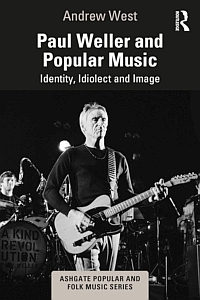There is hardly another active English musician who can look back on a catalog of great music and social comment like Paul Weller, former front man of significant bands of the 1970s, 1980s and well-known solo artist of the 2000s, and also as a political voice addressing important issues.
 On roughly 160 pages author Andrew West, Professor at Leeds Conservatoire, goes through a deep and scrupulous analysis of Weller’s formative influences, his times, social upheavals, experiences and unofficial spokesman for the working class that made the man and the artist.
On roughly 160 pages author Andrew West, Professor at Leeds Conservatoire, goes through a deep and scrupulous analysis of Weller’s formative influences, his times, social upheavals, experiences and unofficial spokesman for the working class that made the man and the artist.
And looking back on statements, lyrics and decisions during the early years of the Jam and the 1980s, Weller today may have communicated a thing or two differently. Often enough he, as successful singer and pop star, would be halfway exploited to be instrumental in supporting the causes of others, be they politicians, leaders or people with an agenda that would appreciate the support of the young crowds Weller and his band would attract. West locates many such instants and comments in hundreds of articles, books, reviews and newspaper bits he cites, mostly from the NME, Melody Maker, Sounds, Mojo, and autobiographies by fellow musicians.
Furthermore, much-appreciated background on several English decades is introduced, which shows the unparalleled and extraordinary status of London as cultural melting pot and place of changing fashions, political struggles and a powerful youth culture in the first of the three chapters. In this respect, the title also stands for a short musical biography of London, the local music journals, record companies, subcultures and consumer policies since the 1960s.
With that background and Weller’s own experience with city life and youth cultures, West takes a closer look at Weller’s political voice, that would make him an “activist” of some sort – decades before the word became popular. With his lyrics, he always proved that he was an attentive and critical observer of political life and how it influenced or maimed anything from youth culture to everyday working-class life.
Several of his songs like “Going Underground,””Down in the Tube Station at Midnight,” or “Eton Rifles” are, in essence, comments on the political climate, failed measures to fight poverty and unemployment, followed by disillusion and violence. Similar comments sporadically were also voiced by other English bands of the 1980s, for example, by the Specials or The Clash.
Weller’s social comments, however, grew even louder in the late 80s, when he witnessed a massive decline of the working class and income levels, as he saw a basic pillar of English life vanishing, initiated by several acts of the Tories. Weller, just like fellow songwriter Ray Davies, always voiced his admiration for working-class life and rituals, and the power within their community. His songs for The Jam and the Style Council often contain links and praise for those particular aspects. Although politics have largely vanished from his most-recent productions, he never made a secret of his disapproval of most things connected to the “establishment,” upper-class arrogance, the Royal family or outdated privileges of the rich.
West correctly presents Paul Weller as an inventor, who was perceived as a torch-bearer and highly creative person in more than one way. He strongly boosted at least one of the Mod revivals of the 70s and 80s with The Jam and continued to use musical idioms of the 1960s, when he started the Style Council, where soul and R’n’B from the favorite Mod soundtracks of thirty years ago were easily recognizable. His nickname “The Modfather,” is also inspired by the outfits he already wore when with The Jam and posing in tight and sleek suits. He always has been a sharp dresser and in the early 2000s, he briefly designed menswear for apparel company Fred Perry that was inspired by mid-60s Mod fashion.
Following Weller’s youth, adolescence, and later achievements, the book starts in the early 1970s (he founded The Jam at the age of 14, although their first LP had to wait until 1977) and ends somewhere around 2021. That accounts for more than 40 years of recording music either with a band, part of an all-star outfit, or solo. Since many of his songs sold extremely well, it is safe to say that at least one or two of his hits “Speak Like a Child,” “Town Called Malice,” “In the City,” or “Walls Come Tumbling Down” are familiar to anybody in England. West devotes the majority of his last chapter to the huge number of Weller’s albums, their respective success, production modes, reviews, and charts positions. These LPs and many other songs are listed in the six page “Recorded sources” index at the end of the title.
And regarding the many awards, titles and recommendations, honorary chairs, appearances, UK Top 40 entries and contributions of all kinds either in writing or recording, it is very likely that this artist will continue to produce excellent pop. The concise biography Paul Weller and Popular Music portrays this artist as an outstanding songwriter and performer, but also as a controversial person.
Review by Dr. A. Ebert © 2023
Andrew West. Paul Weller and Popular Music. Identity, Idiolect and Image. (Ashgate Popular and Folk Music Series) Routledge, 2023, 166p.
